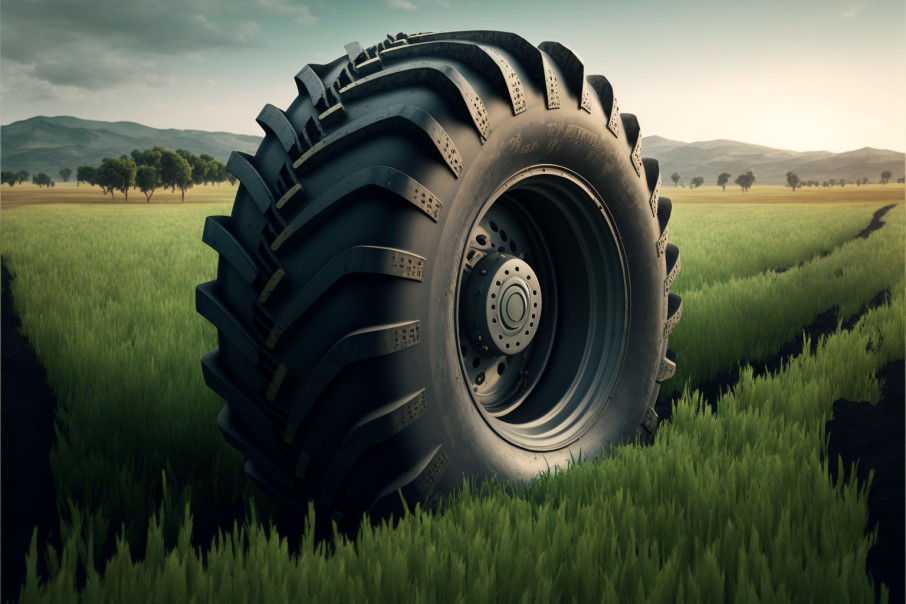How Much Does A Tractor Tire Weigh? (Types & Sizes)

Tractor tires are a crucial component of any farming or construction equipment. They provide the necessary traction and stability for heavy-duty work, and play a major role in fuel consumption and overall cost. One important factor to consider when purchasing or maintaining tractor tires is their weight. Understanding the weight of different types and sizes of tractor tires can help you make informed decisions when it comes to your machinery.
In this article, we will discuss the various types and sizes of tractor tires, including radial and bias-ply tires, as well as the weight of each. We will also cover the factors that affect tractor tire weight and how it can impact the performance of your equipment. Whether you’re a farmer, construction worker, or professional mechanic, this information will be valuable in your decision-making process.
How much does A tractor tire weigh?
The weight of a tractor tire can vary depending on the type of tractor and the size of the tire. Here are some general estimates for the weight of different types of tractor tires:
Radial Tractor Tires
Radial tractor tires are designed with radial construction, which means the cords in the tire run perpendicular to the tread. These tires are known for their durability and long tread life. The weight of a radial tractor tire can vary depending on the size, but on average they weigh between 150-200 pounds.
Bias-ply Tractor Tires
Bias-ply tractor tires are designed with the cords running diagonally across the tire. They are typically less expensive than radial tractor tires and are often used in agriculture and construction applications. The weight of a bias-ply tractor tire can vary depending on the size, but on average they weigh between 120-150 pounds.
Industrial Tractor Tires
Industrial tractor tires are designed for heavy-duty applications such as mining and logging. They are typically larger and heavier than radial or bias-ply tractor tires. The weight of an industrial tractor tire can vary depending on the size, but on average they weigh between 200-350 pounds.
Agricultural Tractor Tires
Agricultural tractor tires are designed for use on tractors used in farming and other agricultural applications. They are typically smaller and lighter than industrial tractor tires. The weight of an agricultural tractor tire can vary depending on the size, but on average they weigh between 100-180 pounds.
| Type of Tractor Tire | Approximate Weight Range (pounds) | Approximate Weight Range (kilograms) |
|---|---|---|
| Radial Tractor Tires | 150-200 | 68-91 |
| Bias-ply Tractor Tires | 120-150 | 54-68 |
| Industrial Tractor Tires | 200-350 | 91-159 |
| Agricultural Tractor Tires | 100-180 | 45-82 |
It’s important to note that these are general estimates and the actual weight of a tractor tire can vary depending on the manufacturer and specific model.
Also, it’s highly recommended to always check the specifications provided by the manufacturer before purchasing or replacing a tractor tire.
How much does a tractor tire weigh without a rim?
The weight of a tractor tire without a rim, also known as the “bead-to-bead” weight, can vary depending on the type and size of the tire. However, it is generally less than the weight of the tire when it is mounted on a rim. The weight of a tractor tire without a rim can be determined by subtracting the weight of the rim from the total weight of the tire and rim.
For example, a radial tractor tire that weighs 200 pounds when mounted on a rim, might weigh around 160 pounds without the rim. Similarly, an industrial tractor tire that weighs 350 pounds when mounted on a rim, might weigh around 300 pounds without the rim.
It’s important to note that these are just estimates and the actual weight of a tractor tire without a rim can vary depending on the manufacturer and specific model. It’s highly recommended to check the specifications provided by the manufacturer or contact the tire supplier for the accurate weight of the tire without the rim.
How does tractor tire inflation pressure affect weight and performance?
Tractor tire inflation pressure plays a crucial role in the weight and performance of the tire. The correct inflation pressure for a tractor tire is specified by the manufacturer and should be followed to ensure the tire performs at its best and lasts as long as possible.
When a tractor tire is under-inflated, it will flex more, causing it to generate more heat and wear out faster. An under-inflated tire will also have more contact with the ground, which increases rolling resistance and leads to higher fuel consumption. Under-inflation also increases the weight on the tire, which can cause more wear on the center of the tread.
On the other hand, when a tractor tire is over-inflated, it will have less contact with the ground, which can result in less traction and stability. An over-inflated tire will also wear out faster on the edges of the tread.
It’s important to note that proper tire inflation pressure is also important for safety reasons, as under-inflated or over-inflated tires can be more prone to failure, leading to possible accidents.
The importance of proper tire maintenance and how it relates to weight
Proper tire maintenance is essential for ensuring that tractor tires perform at their best and last as long as possible. It also plays an important role in relation to the weight of the tire.
Regular tire rotations can help to distribute the weight of the tractor evenly across all four tires. This helps to prevent uneven tire wear, which can cause the tires to wear out faster and may require replacement sooner.
Proper tire alignment is also important for maintaining the weight of the tire. When the wheels on a tractor are not properly aligned, it can cause uneven tire wear, leading to the need for a replacement sooner. Proper alignment can also help to improve fuel efficiency by reducing the amount of resistance the tires have to overcome as they roll.
Balancing the tires can also help to maintain the weight of the tire. If the tires are not balanced, it can cause uneven wear and reduce the life of the tire. It can also cause vibrations which can cause driver fatigue and reduce the stability of the tractor.
In addition, monitoring the tire tread depth is important for maintaining the weight of the tire. When the tread on a tire becomes worn, it can cause the tire to lose traction and stability, leading to dangerous driving conditions. It can also cause the tire to heat up faster, shortening its life.
Proper tire maintenance also includes regular inflation pressure checks, as previously discussed.
Tractor tire weight regulations and safety standards
Tractor tire weight regulations and safety standards are put in place to ensure that tractor tires are safe for use and do not pose a risk to the operator or other road users. These regulations and standards are set by organizations such as the National Highway Traffic Safety Administration (NHTSA) and the Tire Industry Association (TIA) in the United States, and similar organizations in other countries.
One important regulation is the load-carrying capacity of the tire. Tractor tires have a specific load-carrying capacity, which is the maximum weight that the tire can safely carry. This is usually specified by the manufacturer and is based on the size and type of the tire. Tractor tires must meet certain weight and load-carrying capacity standards to be considered safe for use.
Another important regulation is tire inflation pressure. Tractor tires must be maintained at the correct inflation pressure to ensure their weight and performance are optimal. If a tractor tire is under-inflated or over-inflated, it can cause uneven wear and may lead to failure.
Safety standards also dictate that tractor tires must be used within their service life. The service life of a tire is the period of time that the tire is designed to be used, which is usually specified by the manufacturer. Using a tire beyond its service life can cause it to lose its load-carrying capacity and performance, and can become dangerous to use.
How to choose the right size and type of tractor tire for your specific application based on weight considerations?
Choosing the right size and type of tractor tire for your specific application based on weight considerations is important for ensuring optimal performance and safety. Here are some factors to consider when making your choice:
- Load-carrying capacity: The load-carrying capacity of a tractor tire is the maximum weight that the tire can safely carry. Tractor tires have a specific load-carrying capacity, which is usually specified by the manufacturer and based on the size and type of the tire. It’s important to choose a tire with a load-carrying capacity that is appropriate for your specific application to ensure that the tire is not overloaded.
- Tread pattern: Different tread patterns are designed for different applications and terrains. For example, a tire with a deep tread pattern is better for mud and snow, while a tire with a smooth tread pattern is better for pavement and hard surfaces. It’s important to choose a tread pattern that is appropriate for the terrain and application for which the tractor will be used.
- Inflation pressure: The inflation pressure of a tractor tire is important for its weight and performance. Tractor tires must be maintained at the correct inflation pressure to ensure optimal weight and performance. Make sure to choose a tire that can be inflated to the correct pressure for your specific application.
- Size: Tractor tire size is specified by the manufacturer and is based on the size and type of the tire. Make sure to choose a tire size that is appropriate for your specific application. A larger tire size will typically have a higher load-carrying capacity, but it may also be heavier and less maneuverable.
- Type of tire: Radial and bias-ply tires are the two main types of tractor tires. Radial tires are known for their durability and long tread

